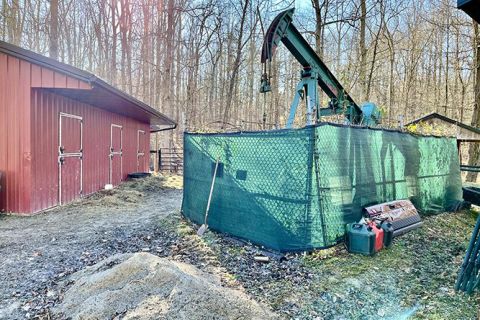
Maverick entrepreneur Aubrey K. McClendon is accused of rigging bids for the purchase of natural gas leases in northwest Oklahoma during a four-year period, the U.S. Department of Justice said March 1.
A federal grand jury indictment filed in U.S. District Court for the Western District of Oklahoma says that McClendon masterminded a conspiracy between two large oil and gas companies to not bid against each other for the purchase of certain oil and natural gas leases.

The Justice Department said the indictment is the first to result from an ongoing federal antitrust investigation into price fixing, bid rigging and other anticompetitive conduct in the oil and natural gas industry.
On March 3, the Justice Department filed a motion to dismiss a criminal indictment against McClendon following his death in a car crash in Oklahoma City.
McClendon, known as a visionary leader who created one of the largest drilling companies in the U.S., is accused of engaging in a conspiracy that ran from December 2007 to March 2012; a period in which McClendon served as CEO of Chesapeake Energy Corp. (NYSE: CHK) until he was forced out of the company, the Justice Department said.
“While serving as CEO of a major oil and gas company, the defendant formed and led a conspiracy to suppress prices paid to leaseholders in northwest Oklahoma,” said Assistant Attorney General Bill Baer of the Justice Department’s Antitrust Division. “His actions put company profits ahead of the interests of leaseholders entitled to competitive bids for oil and gas rights on their land. Executives who abuse their positions as leaders of major corporations to organize criminal activity must be held accountable for their actions.”
On his American Energy Partners website, McClendon said in a statement that the single charge of an antitrust conspiracy “is wrong and unprecedented.”
“I have been singled out as the only person in the oil and gas industry in over 110 years since the Sherman Act became law to have been accused of this crime in relation to joint bidding on leasehold,” McClendon said. “Anyone who knows me, my business record and the industry in which I have worked for 35 years, knows that I could not be guilty of violating any antitrust laws.”
Each violation of the Sherman Act carries a maximum penalty of 10 years in prison and a $1 million fine for individuals.
McClendon said he has worked to create jobs in Oklahoma, grow its economy and to provide abundant and affordable energy to Americans.
“I am proud of my track record in this industry, and I will fight to prove my innocence and to clear my name," McClendon said.
McClendon's lead lawyers, Abbe Lowell of Chadbourne & Parke and Emmet Flood of Williams & Connolly, said the Justice Department has taken business practices “well-known in the Oklahoma and American energy industries that were intended to, and did in fact, enhance competition and lower energy costs and twisted these business practices to allege an antitrust violation that did not occur.”
The Justice Department accuses the bidding companies of deciding ahead of time who would win leases. The winning bidder then allocated an interest in the leases to the other company, the department said.
“McClendon instructed his subordinates to execute the conspiratorial agreement, which included, among other things, withdrawing bids for certain leases and agreeing on the allocation of interests in the leases between the conspiring companies,” the Justice Deparment said.
McClendon’s attorneys said the Justice Department’s filing is a response to criticism of their past charging practices and an attempt to showcase a policy to be tough on individuals.
“The prosecutors have wrongfully singled out Aubrey McClendon and have wrongly charged an innocent man,” the attorneys said. “A charge is one thing. Proving the case is another. Starting today, Aubrey gets his day in court where we will show that this prosecutorial overreach was completely unjustified.”
The investigation is being conducted by the Antitrust Division’s Chicago Office and the FBI’s Oklahoma City Field Office, with assistance from the U.S. Attorney’s Office of the Western District of Oklahoma.
In December, the Pennsylvania attorney general’s office filed suit against Chesapeake, accusing it of deceptive conduct in securing fracking leases and later underpaying Marcellus Shale royalties.
The suit says Chesapeake engaged in a self-dealing scheme that resulted in reduced royalty payments to landowners.
Since leaving Chesapeake, McClendon has focused his efforts on American Energy Partners. In February 2015, McClendon was sued by Chesapeake for appropriating the company’s Utica Shale data prior to stepping down from the company in 2013.
McClendon and AEP said that the suit was a “baseless legal action.”
Darren Barbee can be reached at dbarbee@hartenergy.com.
Recommended Reading
NAPE: Chevron’s Chris Powers Talks Traditional Oil, Gas Role in CCUS
2024-02-12 - Policy, innovation and partnership are among the areas needed to help grow the emerging CCUS sector, a Chevron executive said.
US Coast Guard Investigating Oil Spill Off California Coast
2024-03-08 - The U.S. Coast Guard is responding to an oil spill off the coast of Huntington beach.
Well Done Foundation Wins California Orphan Well Project
2024-02-12 - Nonprofit Well Done Foundation will plug orphan wells in Santa Barbara County, California, starting in Orcutt and Santa Maria.
Pemex GoM Oil Platform Blaze Leaves One Dead, 13 Injured
2024-04-08 - A Coter contract worker died from a fire that broke out at Pemex’s Akal-B platform this weekend that also left several others in serious condition, the company said.
Diamondback May Go Nuclear to Power Permian Basin Ops
2024-04-08 - Oklo Inc., a California fission power plant developer, on April 8 said it signed a letter of intent to collaborate with Diamondback Energy on implementation of nuclear energy for drilling operations in the Permian Basin.





